Is Etsy legit? What to know about built-in protections and scams in 2025
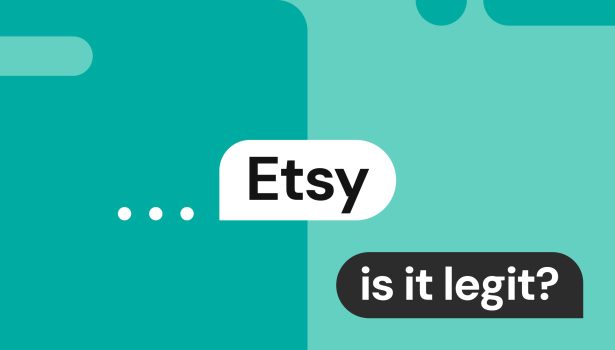
Etsy is a legitimate, long-established online marketplace. It encrypts data in transit and at rest, offers secure payment processing, and provides buyer protections. That said, being a peer-to-peer platform means the overall trustworthiness may vary by seller. Moreover, many users report inflated prices due to high seller fees, sudden policy changes, and delayed or missing orders.
To shop safely, always pay through Etsy’s checkout system, scrutinize seller reviews and product descriptions, and be cautious of prices that seem too good to be true.
Is Etsy a trusted website?
Etsy is a trusted platform, created in 2005 and designed for artists to get more visibility and achieve more sales. It became a certified B Corporation in 2012—a demonstration that it meets high social, accountability, and transparency standards—and it went public in 2015 (though it chose not to renew the certification after 2017).
Sales skyrocketed in 2020 during the pandemic, when many people were looking to buy unique, handmade face masks. It’s been facing some ups and downs since then, but its business remains strong overall.
Etsy is primarily known as a peer-to-peer (P2P) model, but businesses are also present. The company charges sellers a $0.20 fee to list an item for four months (or until it sells), and it takes a commission on every sale.
Etsy’s security measures
Etsy takes the following measures to make sure the website is secure and user data is safe:
- Encryption. TLS/SSL encryption keeps personal information like credit card details safe in transit, and Etsy stores this data securely as well to prevent it from being intercepted by hackers.
- Secure payment system. Through Etsy Payments, sellers never actually get their hands on buyers’ credit card information. This is one reason why scammers often try to take transactions off-platform (a major red flag).
- Two-factor authentication (2FA). Etsy encourages users to employ secure passwords and set up two-factor authentication that requires a verification code every 30 days as well as whenever someone signs in from a different browser or device.
- Sign-in history monitoring. There’s always the possibility of your account being broken into, especially if you’ve clicked on a phishing link. Etsy tracks sign-ins and lets you review the history to identify logins/ devices that you don’t recognize.
- Fraud detection algorithms. The Etsy website regularly monitors itself for suspicious activity such as lots of identical product descriptions, stolen images, and multiple similar shops popping up all at once.
Why do some people question Etsy’s legitimacy?
First off, there’s the fact that peer-to-peer (P2P) platforms naturally attract scammers. This sort of thing isn’t Etsy’s fault; it’s just the nature of the game.
That said, some of the issues are, in part, caused by Etsy’s actions over the years—mainly regarding what it has allowed to surface on the platform. It was initially created as a place for people to find unique, handmade items from smaller artists, but now there are lots of larger businesses listing their stuff to access a new customer base, and there are even drop shippers selling store-bought merchandise at a premium while calling it “handmade.” Etsy’s efforts to combat this have been simultaneously deemed insufficient and also likely to hurt people who are using the site in an honest manner.
Another long-running reason for frustration is transaction fees. Every sale comes with a $0.20 fee for listing an item, 6.5% on the sale price (including shipping), and about 3% for payment processing. On top of that, Etsy may deduct additional costs if sellers participate in Etsy Ads or if their products are promoted through mandatory Offsite Ads, which can take up to 15% of the order value if a purchase results from that advertising.
For one, these layered fees eat into sellers’ profit margins. For another, many sellers pass those costs onto buyers by raising prices which results in Etsy items sometimes feeling inflated compared to other platforms. For buyers, this creates skepticism about whether Etsy really delivers value for the requested price; for sellers, it multiplies complaints that the company is prioritizing its own profit over the artisans it was built to support.
More than anything, however, people selling on Etsy lament the fact that there’s simply been too many changes for them to handle.
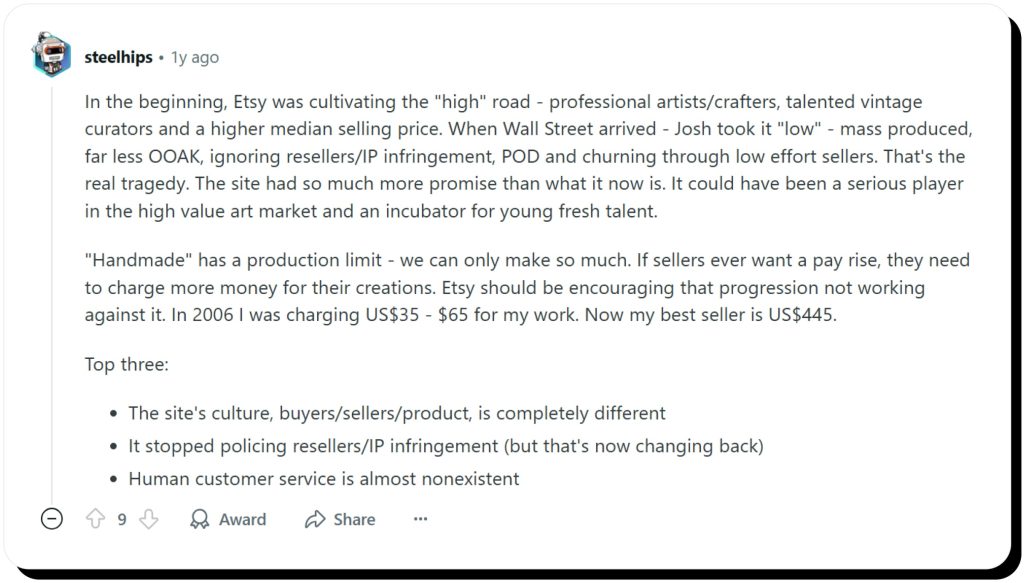
Ultimately, Etsy is a trusted website that—like many others—has been rocked by the winds of change and is doing what it deems necessary to stay competitive and relevant.
Is it safe to buy on Etsy?
Etsy is relatively safe to buy from if you do due research. Here’s a quick rundown of protections buyers can rely on:
- Full refunds for items that arrive damaged or don’t arrive at all. This purchase protection also applies to items that end up looking significantly different from the official photos.
- Ability to open a case if there’s a problem. If you’re unable to resolve a problem with a seller, you can open a case after 48 hours and Etsy will help mediate.
- Review and rating system. People who buy from Etsy can leave a review of the item and rate their experience within a 100-day window, starting from the day of receipt.
- Bans on drop shipping (in most cases). Etsy doesn’t want people getting tricked into shelling out “handmade” prices for something that actually came from a site like AliExpress. The website prohibits reselling mass-produced goods as handmade—but does allow sellers to use production partners.
- Secure payment processing. As mentioned earlier, your payment information won’t be exposed to the owner of the Etsy shop you’re buying from.
These protections can’t weed out every possible risk, however, so you should always look out for anything that doesn’t seem quite right.
Common scams targeting Etsy buyers
There’s a range of scams that target people buying from P2P sites. These can be grouped into a few distinct categories.
First, there are scams where fraudsters try to get your personal info:
- They might pretend to be Etsy help staff, and they’ll trick you into revealing personal info, like a password or a credit card number. Some scammers can even make their number show up in Google results for Etsy customer service, as was the case when one woman lost her life savings to an Etsy scam.
- Their (fake) Etsy shop might contain links to malicious websites that look like Etsy but are actually designed to grab sensitive information from you. They’ll either have malicious links that download spyware on your device or direct you to forms that require submitting personal details.
Next, there are scams where the seller sends you something of low value or nothing at all. These include:
- The dreaded drop shipping scams where they say it’s “handmade” but it’s really just something from a site like Temu. Some people end up paying up to seven times what they would have paid on the site the item originally came from.
- Scams where they edit your address to send the item somewhere else (possibly within the same zip code to confuse Etsy). They might push the estimated delivery date as far out as possible in order to delay your ability to open a case. Scammers can even spoof tracking numbers or use stolen ones to make it look like they delivered your item properly. The goal is to trick Etsy and the shipping carrier into showing an order as “delivered” so the scammer can keep the buyer’s money without ever delivering the real item.
Ultimately, it’s important to keep in mind that these scammers aren’t Etsy itself—they’re just bad actors taking advantage of a platform that connects people.
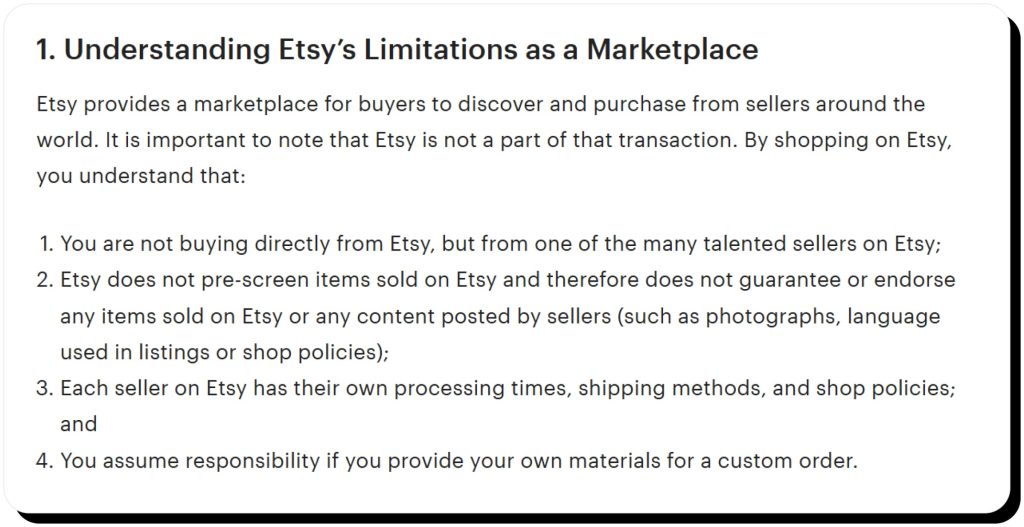
How to spot trusted sellers on Etsy
Unfortunately, in the age of GenAI and a myriad photo-altering tools, scammers have ways to make their malicious Etsy shops look quite convincing. However, there are still some rules of thumb that can minimize your shopping risk:
- Look for clear shop policies and return details. Sellers create their own policies, and legit people will put some actual effort into honing them and spelling them out.
- Gravitate towards detailed product descriptions with original photos. It can help to familiarize yourself with how to spot AI-generated, photoshopped, or stolen photos.
- Make sure there’s a high volume of positive reviews. This tip penalizes brand-new Etsy shops, sadly, but sometimes it’s better to be safe than sorry.
- If you’re unsure, send them a message. Ask them a question about one of their products, and evaluate how they reply. Avoid sellers that don’t provide specifics, reply with generic phrases, and make multiple grammatical mistakes.
Is Etsy safe to sell on?
Selling on Etsy is generally safe as the company has a set of protections designed to minimize risk as much as possible:
- If an item doesn’t arrive, arrives late, or there are disputes about listing accuracy, Etsy may cover a refund without holding the seller responsible (for orders that total up to $250 USD).
- Order tracking integration allows sellers to upload and sync tracking directly to Etsy and provides proof of shipment in case of disputes.
- In case a refund is requested, sellers can present evidence like tracking, photos, or receipts and Etsy will review both sides.
- Etsy’s automated fraud monitoring flags suspicious transactions and helps prevent scams before sellers ship orders.
Common scams targeting Etsy sellers
Though buyers are the ones most commonly targeted by fraudsters on Etsy, sellers encounter a fair share of scams as well:
- Off-platform payments: buyers ask to pay through Cash App, Venmo, or bank transfer instead of Etsy Payments. If sellers agree, they lose Etsy’s protections and risk chargebacks or outright theft.
- Overpayments: a buyer “accidentally” pays more than requested and asks the seller to refund the difference. Then, the original payment is reversed and the seller loses their own money.
- Fraudulent returns: a buyer claims an item is defective and sends back a different, cheaper, or damaged one. If the seller doesn’t have proper documentation and photos of the item’s original state, they may be forced to issue a refund.
- Fake orders or buyer accounts: scammers place large orders with stolen payment info to trigger chargebacks later. Sellers lose both the product and the payout when the chargeback hits.
In addition to these, scammers are always on the lookout for your personal details, so sellers are targeted with phishing attacks as well.
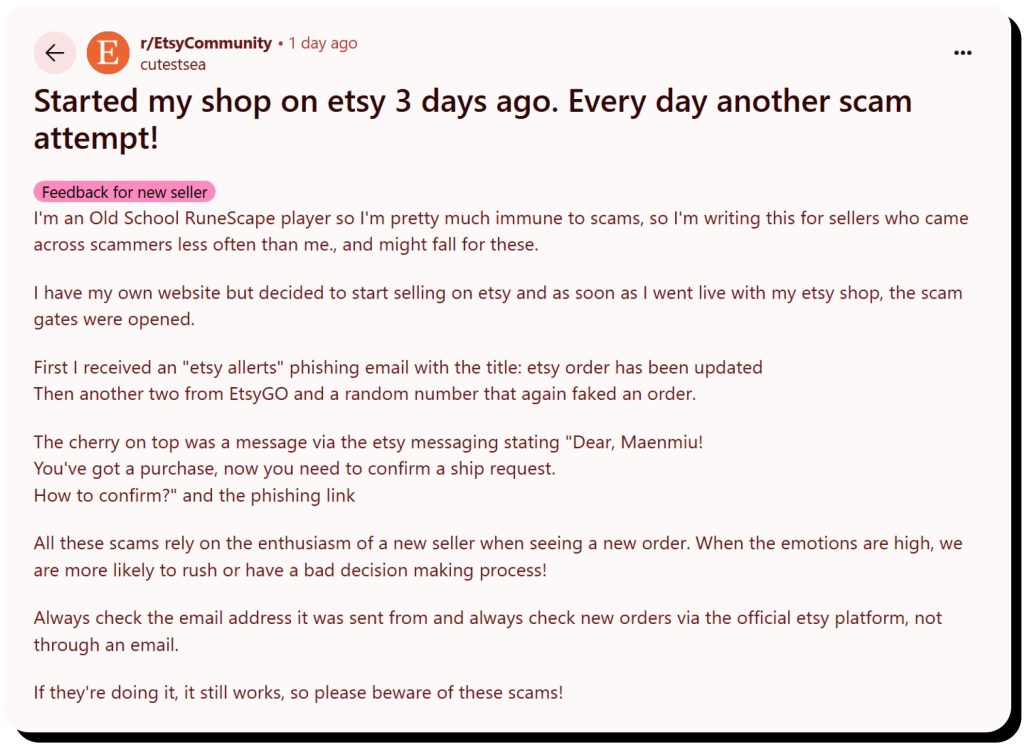
Tips for safe buying and selling on Etsy
As long as you do your research and educate yourself on common scams, Etsy can be a good place to find some original products. To stay safe and ensure your shopping experience is smooth, follow these tips:
- Always pay through Etsy, never off-platform. Outside of Etsy, you won’t have the same protections or ways to get your money back.
- Don’t go to any websites that aren’t Etsy. If you’re worried about links spoofing the Etsy site, look carefully at the URL to make sure it’s https://www.etsy.com.
- Read the reviews and sort by the most recent. If there are hardly any reviews, or if the most recent ones are bad, you might want to choose another seller.
- Reverse-image search the product photos to make sure they haven’t been stolen from another site/ seller. It’s also a good idea to learn how to spot photoshopped and AI-altered images.
- Message sellers with specific questions. If they’re really selling the product, you can expect them to give reasonably prompt, informative answers with additional photos.
- Check estimated delivery times. If they’re overly long, that could indicate the seller is trying to buy time.
And a rule of thumb: never share your personal info, and don’t continue with any transaction that feels fishy. Selers don’t need to know any more about you than what’s already in your profile.
Frequently asked questions
Is Etsy legit?
Yes, Etsy is a legitimate, publicly traded company that’s been in business for more than 20 years.
Is Etsy safe to use?
Yes, Etsy is generally safe to use as a buyer or a seller, but the usual P2P platform precautions apply (don’t share personal info, don’t take transactions and communications off-platform, research the seller, etc.).
Is Etsy reliable?
Etsy is trustworthy as long as you stay up to date with its policies and fees. It’s also important to learn what scams are typical for P2P platforms so that you know what red flags to pay attention to and what sellers/buyers to avoid.
Is Etsy good?
The answer depends on what you mean by “good.” Etsy itself is a reliable platform that has protections in place such as secure payments and claim resolution. However, much depends on the seller and the way you complete a transaction.
Is Etsy a scam?
No, Etsy is not a scam but a legitimate peer-to-peer platform for buying and selling handmade goods, vintage items, artwork, and other unique products from independent creators around the world. However, your shopping experience depends on sellers—some of whom can be scammers.


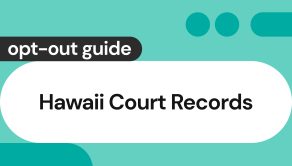


Mark comes from a strong background in the identity theft protection and consumer credit world, having spent 4 years at Experian, including working on FreeCreditReport and ProtectMyID. He is frequently featured on various media outlets, including MarketWatch, Yahoo News, WTVC, CBS News, and others.